Published Apr 10, 2014
Searching For Spock By Phone
Searching For Spock By Phone
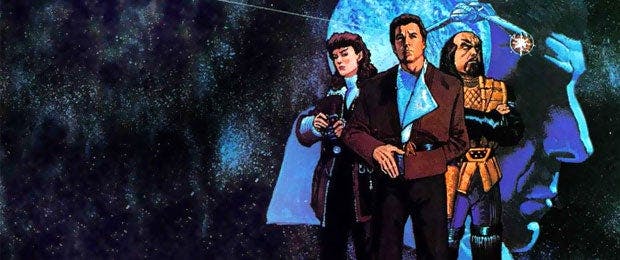
I'm not a big fan of phone interviews. I've been interviewed myself by phone (for USA Today, TV Guide, The Wall Street Journal, The New York Daily News, etc.), and that was all right. I didn't have to ask questions (just answer them) nor did I have to transcribe the results. Thank the Maker for that!
Then again, I've quizzed a number of folks by phone (Gene Roddenberry, John Lasseter, Joe Dante, John Lithgow, George Romero, etc.) -- and it has always been vaguely dissatisfying even when, as in all those examples, I later met the interviewee in question. It's just somehow more stressful to listen on the phone (either via speaker or with a receiver cradled in your neck muscles in the pre-cell era) while studying your list of prepared questions, ad-libbing impromptu follow-up queries and worrying about a whirling tape recorder. Yes, you don't have to get dressed up for phoned-in encounters (as if I ever did for any occasion whatsoever) but still... All of my Starlog writers were skilled in phoners (some doing them almost exclusively); however, if I'm the one asking questions, I personally prefer to interview people in person.
Also, it's because things can go wrong. Case in point: veteran TV
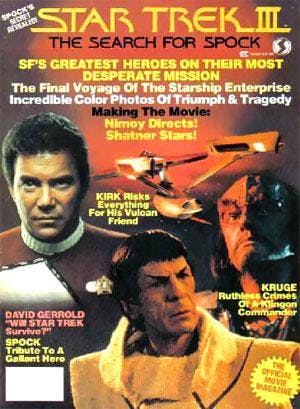
He was quite candid about his reputation as "the Saviour of Star Trek," earned due to his Khan work. "As producer of Star Trek II, I had been asked to, in effect, resucitate a beached whale because Star Trek: The Motion Picture had not been what everyone had hoped it would be," Bennett told me. "The reason there is a Star Trek III is the success of Star Trek II in revitalizing the audience's appetite, creating the demand for the adventure to continue."
Following premature, pre-lensing reports of Spock's death, Bennett said that he had rewritten Jack B. Sowards' Trek II script, restructuring it to shift the Vulcan's earlier end to the film's finale. Later, after preview audiences, seeing an early cut of the movie, indicated they wanted more details about Spock's passing, Bennett and director Nicholas Meyer arranged two days of reshoots. They stirred in further ambiguous elements: Spock mind-melding with McCoy and urging him to
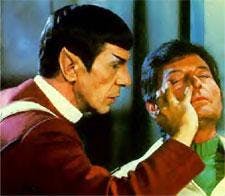
But we were on the phone to talk about Trek III, directed by Leonard Nimoy, and then less than three months from release. Those added ambiguities had allowed Bennett, as Trek III's solo screenwriter, to face the narrative challenge and conjure a scenario where it made science-fictional sense for Spock to live again. Or as I put it in my article's lead paragraph (here I am, yes, absurdly, quoting myself from 1984): "After killing off Spock, what do you do for an encore?"
What, indeed? Well, you could ratchet up the stakes with further scripted sacrifices---unexpected death and destruction. And Bennett did just that (SPOILER ALERT!), eliminating both Kirk's recently discovered, grown son David Marcus (Merritt Buttrick) and the starship they all came in on. As a mournful, rejoicing Kirk is told, "At what cost? Your ship! Your son!"
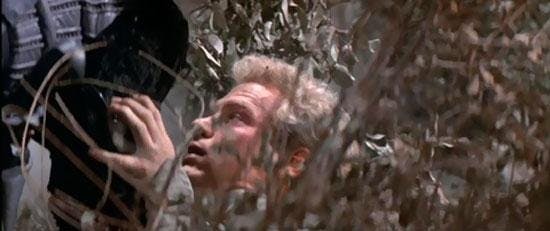
"The death of David Marcus is a tragedy," Bennett told me. "But truthfully speaking, we [Bennett, Nimoy and associates] didn't know what to do with the character; David Marcus was not very well-defined. We discussed the matter and thought that he might best serve the needs of the story by being killed off. And that's what happens.
"The destruction of the Enterprise is also shocking, but it works. Kirk really has no other choice, it's the only solution to this no-win situation. And it, too, is a heroic way to go -- a sacrifice in itself."
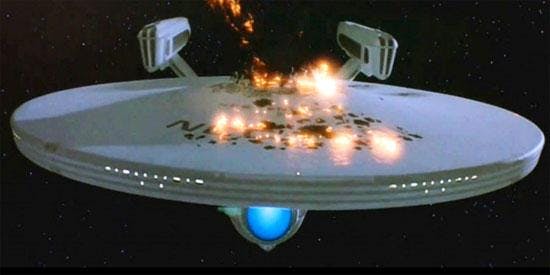
Speaking of sacrifice, something had just come up at Paramount and Bennett said he had to cut short the time allotted for our conversation and deal with it. I still had five or six questions left. "Call me back tomorrow at the same time," he generously offered, "and we'll finish this then."
Fine. I didn't absolutely need all those answers, but I transcribed our half-hour chat and rang him up the next day, nonetheless. I engaged Starlog's permanently installed interview phone jack and switched on my tape recorder. And we talked for 10 or 15 more minutes. I thanked Bennett for his time and bid farewell. Then, I rewound the tape to playback and transcribe today's talk. I didn't hear anything like that. Just the silence of prolonged audio hiss. Something had gone wrong with the taping system (which had worked perfectly yesterday); now, it offered only blankness.
Heavy sigh from me. However, as we know, there are always possibilities and, actually, I already had sufficient quotes. So, I resisted the major temptation (and minor professional humiliation) to call Bennett back and beg for a repeat installment of what he had just said. A half-hour's worth of material was more than enough for me to write the piece I've repeatedly quoted from above.
Much like those other long-distance interviewees noted earlier, I got my chance to say hello to Bennett in person a few months later -- in this case, at an Official Starlog Festival convention in Los Angeles. In a moment, the results of that meeting. Meanwhile, let's break for one paragraph to relate a classic anecdote about legends past.
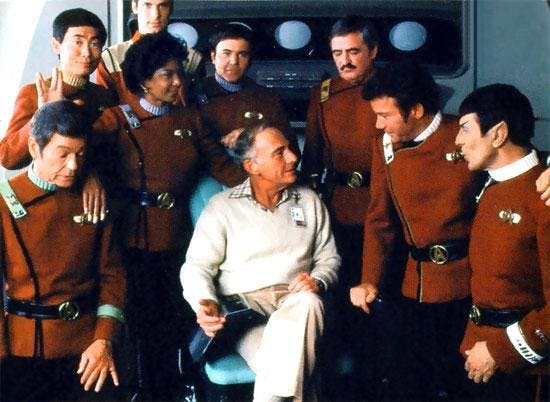
Once upon a time in the 1950s, after they were first married, superstar movie actress Marilyn Monroe and heroic baseball player Joe DiMaggio visited Europe (London, I believe). They appeared in public where assembled crowds greeted Monroe, then the most famous actress on Planet Earth, with a tumultuous roar of pure adulation. As I recall it, a beaming Monroe turned to her husband. "Joe, have you ever heard anything like that?" And DiMaggio, the iconic ball player known as the Yankee Clipper, long accustomed to the equally massive cheers from worshipful fans in bleachers across America, just looked at her. As a matter of fact, he had.
Now, I only discovered that ironic fable about the acclaim of fame a few years ago. But it immediately reminded me of meeting the charming, personable Bennett in 1984. We were off-stage, watching Starlog co-publisher Kerry O'Quinn at the lectern begin a long and effusive introduction for the about-to-speak Bennett. The crowd erupted at the first mention of his name, wildly cheering "the Saviour of Star Trek." And I turned to Bennett -- who first gained fame as a mere teenager facing live studio audiences as one of radio's popular Quiz Kids from 1941-6 -- and told him, "The fans really love you! Have you ever heard anything like that response?" And citing what I had forgotten, his early Quiz Kids fame and its similar audience acclaim, Harve Bennett grinned. As a matter of fact, he had.
David McDonnell, "the maitre’d of the science fiction universe," has dished up coverage of pop culture for more than three decades. Beginning his professional career in 1975 with the weekly "Media Report" news column in The Comic Buyers’ Guide, he joined Jim Steranko’s Mediascene Prevue in 1980. After 31 months as Starlog’s Managing Editor (beginning in October 1982), he became that pioneering SF magazine’s longtime Editor (1985-2009). He also served as Editor of its sister publications Comics Scene, FangoriaandFantasy Worlds. At the same time, he edited numerous licensed movie one-shots (Star Trek and James Bond films, Aliens, Willow, etc.) and three ongoing official magazine series devoted to Trek TV sagas (The Next Generation, Deep Space Nine, Voyager). He apparently still holds this galaxy’s record for editing more magazine pieces about Star Trek in total than any other individual, human or alien.
Copyright 2014 David McDonnell
